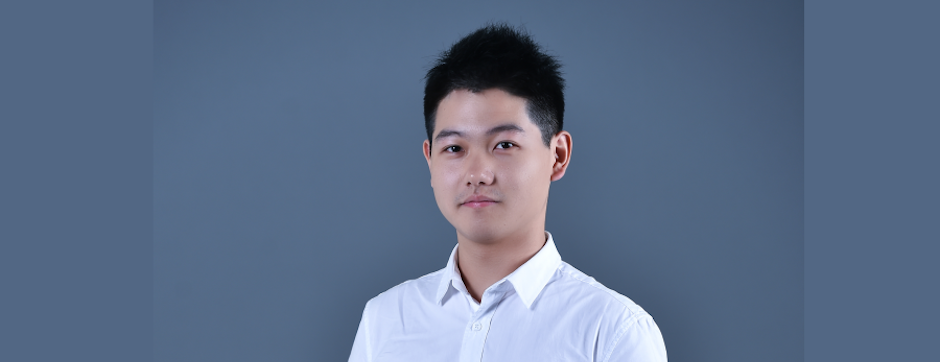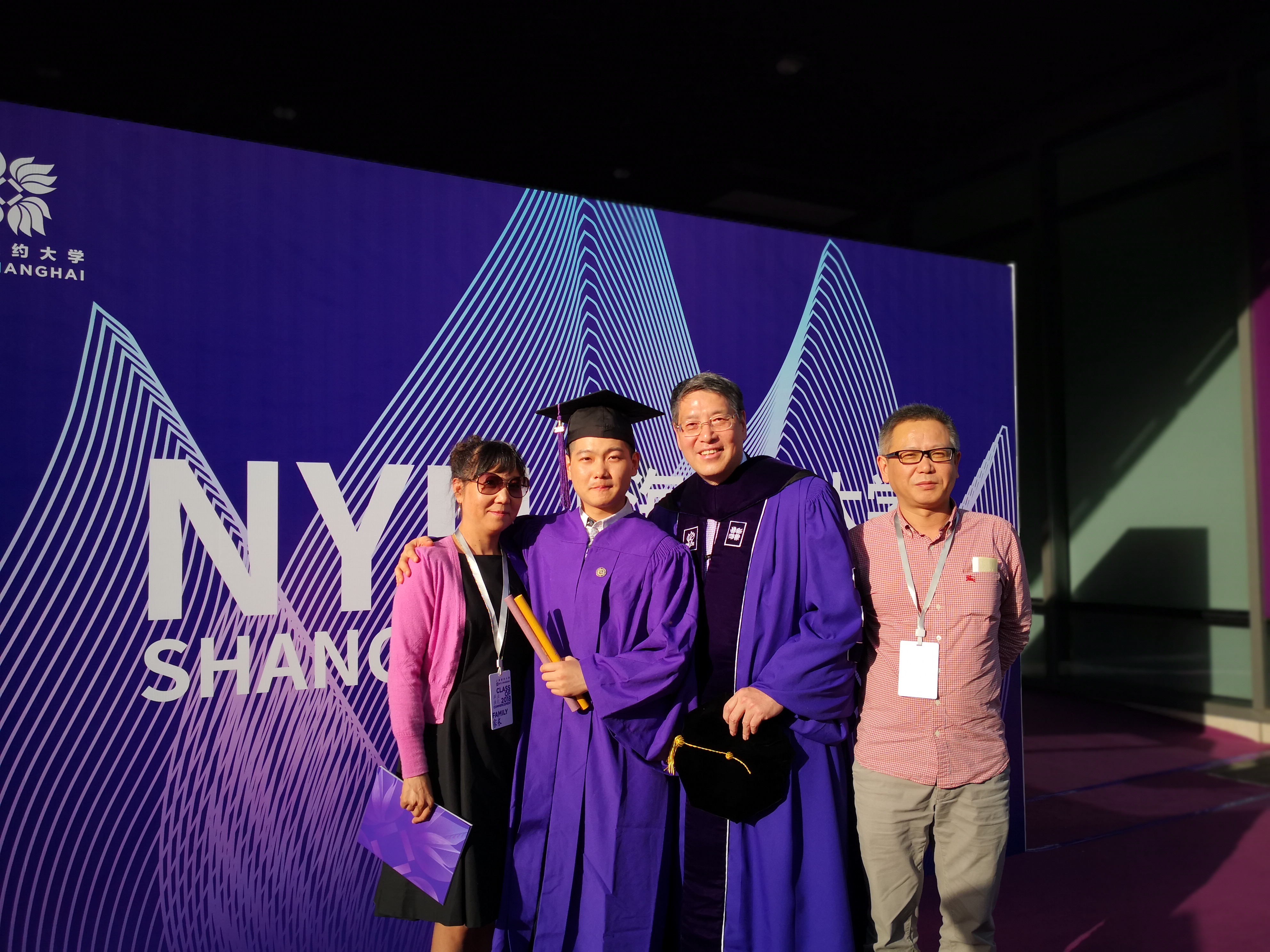
Alumnus Chen Yuhang is now pursuing a PhD in Quantitative and Computational Biology at Princeton University, exploring his interests in both biophysics and neuroscience.
He shares how the curriculum at NYU Shanghai has helped him to find his true academic interests, and what he misses the most about his four years on Century Avenue.
What made you choose NYU Shanghai?
I have always been passionate about trying new things and meeting new people. However, in China, the path for high school students is pretty much set, which is by preparing for and taking the Gaokao, the National College Entrance Examination in China. I was lucky enough to hear about NYU Shanghai, which sounded new and exciting. A brand new university with excellent faculty and international students? NYU Shanghai was everything I dreamed of. I would say I was really lucky I chose to apply to NYU Shanghai before taking the Gaokao. If more students knew about the opportunity to ‘make the world your major’ at NYU Shanghai, I think they would make the same choice. Attending NYU Shanghai was the best decision in my life.
You were a physics major. How did the curriculum at NYU Shanghai help you explore your interest in physics?
My official major was physics, but my study experience went far beyond this single discipline.
I definitely thrived on the Foundations of Science curriculum, which was intended for all natural science majors. As a physics major, I took all elementary chemistry and biology courses as well. The experience of taking courses with classmates with different majors greatly sparked my interest in natural science as a whole. Meanwhile, I began to notice that the Nobel Prizes in recent years are mostly awarded for breakthroughs that could only be achieved through interdisciplinary collaborations, which is consistent with the takeaway I gained through FoS.
What I enjoyed most about my undergraduate studies was watching great ideas emerging from the collision of different perspectives. No matter which course I took, it was always rewarding to talk to people from different disciplines. For example, one of my classmates in Computational Chemistry was an expert in theoretical chemistry, while I was more familiar with physics. Not only were we able to fill each other’s knowledge gaps with our own expertise, he also helped me better understand physics through its applications in computational chemistry. This takeaway also applies to disciplines well beyond science as well.
Every NYU Shanghai student will study away for at least one semester. where did you choose to study and why? And how has this unique study away experience benefited you?
I first went to Abu Dhabi for one semester because they have a wonderful physics faculty and facilities. I joined Professor Andrea V. Macciò’s research group, which was working on the simulations of galaxy formation. I had zero previous programming experience. But Prof. Macciò was so nice that he personally spent hours teaching me how to program - it was as if he was giving a private lesson. I was greatly touched by his kindness and patience.
At NYU Abu Dhabi, another fruitful experience was from the course, Advanced Physics Laboratory. Our group aimed to measure the speed of light by taking advantage of the synchronization of the two photons from pair production. It was an experiment that had never been done in this lab before by other classmates. We had to build everything from scratch—assembling the equipment, setting up the scheme and calibrating the detectors. The time and effort finally proved to be worthwhile as our results had only a 0.02% difference with the generally accepted value. That semester in Abu Dhabi strengthened not only my coding and laboratory skills, but also the self-confidence to tackle challenges through endeavor and dedication.
I went to New York for the next semester. I took a graduate level course in biophysical modeling taught by Professor Edo Kussell. And I got intrigued by the interplay between physics and biology. I was shown how physics and mathematics could bring innovative insights to biological questions, such as describing the Lac operon in E.coli as a bistable dynamic system and illustrating DNA looping from a statistical-mechanical view. That’s when biophysics became my main field of interest.
 Chen Yuhang and his parents with Chancellor Yu during the Class of 2018 Commencement
Chen Yuhang and his parents with Chancellor Yu during the Class of 2018 Commencement
NYU Shanghai students come from over 70 countries, and everyone brings their own background, experience and ideas to the campus. Our student body is purposely designed to foster cross-cultural exploration, with each Chinese student rooming with an international student in their first year. Can you share with us how this multicultural environment has enriched you personally, professionally and academically?
I would say I, as a person, grew immensely from these experiences. As I mentioned earlier, academically, I found bringing together different perspective really helpful to produce great ideas and thus tackle difficult problems. Personally, I learned numerous valuable aspects when it came to meeting people with totally different backgrounds such as ethnicities, sexual orientations and religions. Besides staying open-minded and respectful, one needs to take the initiative to break the ice and communicate. My roommate was from Israel and I encountered cultural barriers every now and then, but as I stepped out of my comfort zone, I was deeply shocked by how much we actually had in common.
You are studying for a PhD in Quantitative and Computational Biology at Princeton University. Can you tell us more about it and why you are interested in it?
It is a PhD program with a biology focus, but most faculty are not typical biologists. They consist of physicists, computer scientists, mathematicians, neural scientists, etc. The program is really about solving biological questions through multi-disciplinary methods. I am interested in both biophysics and neuroscience. And I think the Quantitative and Computational Biology program Princeton is a unique place where faculty from the two fields conduct research in the same building. I have not decided a particular direction to focus on yet, and this program provides a fairly flexible curriculum, where I can do rotations in labs of different fields and take courses in different fields at the same time. It can not be more perfect for me.
What do you miss the most about NYU Shanghai?
I really miss our small but cozy campus, where everyone just came across each other in the cafe, canteen, and lounges. I miss the flag football team and badminton free plays every week. I miss the times when we had to stay on campus to finish some projects late into the night and we would play some table tennis and grab some street food for a break.
Do you have any post-graduate school plans?
Ideally, I want to come back to China and become an independent researcher and ultimately be able to make my own contributions to improving the wellbeing of others.

